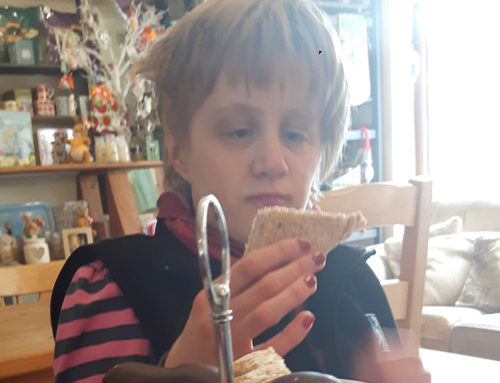Issy
Issy was born in 2002, the second of our three children and we knew right from the start that something was wrong; she was not developing in the same way as her peers.
She was born with a low birth weight, with microcephaly, and suffered as a baby from feeding difficulties and severe reflux. She had delayed development and was late smiling, rolling, sitting up and hitting ‘normal’ development milestones. We had frequent visits to hospital to treat the reflux, gastro problems and failure to thrive. At nine months Issy had an MRI scan as her Consultants had benchmarked her failure to hit developmental milestones and wanted to investigate possible explanations. Issy also went for extensive genetic testing at Great Ormond Street Hospital. The genetic testing proved inconclusive and she did not receive any diagnosis.
Receiving physio and other treatments (e.g. occupational therapy and portage), Issy managed to walk when she was nearly three, and became verbal at nearly four – both wonderful moments. Still undiagnosed, she attended a wonderful special needs nursery and primary school.
In 2010, we were contacted by our Geneticist and asked if we would be prepared to participate in the Deciphering Developmental Disorders (DDD) project. We jumped at the chance, especially as it only involved saliva samples rather than the dreaded blood tests. Issy, her Dad and I were all tested. At that point, we did not expect to receive any diagnosis, we merely thought we would be part of an extensive data gathering research exercise, but continued to hold out some hope that in the future, they would find a reason for Issy’s condition.
To our surprise, five years later, we received a phone call to let us know that Issy had been diagnosed with a mutation in her DDX3X gene, a newly discovered ‘de novo’ syndrome predominantly affecting girls. We did as everyone does — hit Google —and we were surprised to discover that very little was known about the DDX3X gene at all.
In August 2015 a paper was published in the American Journal of Human Genetics, entitled, ‘Mutations in DDX3X are a common cause of unexplained intellectual disability with gender-specific effects on Wnt signalling’, written by an inspirational researcher who had discovered this mutation and who consequently headed up the team of worldwide researchers who produced this first research paper on the DDX3X syndrome. The DDX3X gene mutations were linked to intellectual disabilities (ranging from mild to profound), abnormalities of the brain, seizures, and autism.
The Facebook page, DDX3X Support UK has been invaluable in connecting us to other families in the UK, we have had our first meet up and it is a great resource for signposting issues and solutions that we all have in common.
Issy continues to amaze us with her joyful love of life, her perseverance and her kind, sociable nature – she is a world expert on dinosaurs and Thomas the Tank Engine!




